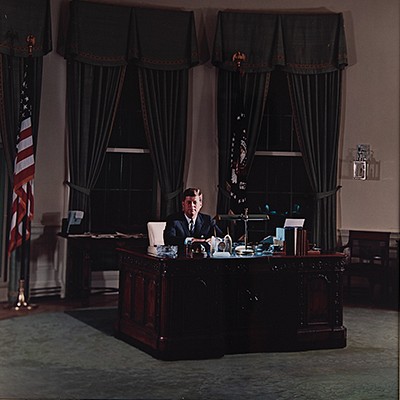Malcolm X Signed Page for Alex Haley’s 1963 Playboy Interview - Discussing Elijah Muhammad and 'white America'
Two ways to bid:
- Leave a max absentee bid and the platform will bid on your behalf up to your maximum bid during the live auction.
- Bid live during the auction and your bids will be submitted real-time to the auctioneer.
Bid Increments
| Price | Bid Increment |
|---|---|
| $0 | $5 |
| $50 | $10 |
| $200 | $25 |
| $500 | $50 |
About Auction
Nov 8, 2023
RR Auction's November Fine Autographs and Artifacts auction offers an extraordinary and wide-ranging selection of the rare and remarkable. RR Auction support@rrauction.com
- Lot Description
Page 37 from the original typescript of Alex Haley’s 1963 interview of Malcolm X for Playboy magazine, one onionskin page, 8.5 x 11, signed "Malcolm X" in the bottom margin (with a marginal line indicating his approval of the contents). In full: “[Malcolm X] Sir, let me tell you one thing. The black nation of Egypt is the only country that has a science named after its culture — Egyptology. That's just another way of saying Africology, because Egypt is in Africa. It's an African culture. [Haley] Mr. Malcolm, a thought keeps recurring. Awhile back, you spoke almost in a wistful way, reflecting your pleasure and satisfaction at having spoken at the Harvard Law School Forum. Mr. Malcolm, do you never stop to think that if you, with your natural endowments, had taken a different life course, you might today, at thirty-seven, be a respected practicing lawyer, a young executive in any profession, and enjoying the prestige that would go with it? Instead of here — [Malcolm X] I have no dissatisfaction whatever with what I am here, sir. I can imagine for me no greater privilege or honor than that of being able to speak the teachings of the Honorable Elijah Muhammad. He is the only one that has ever done anything good for me. The white man, America, did not bring out any talent that I had. At my most impressionable age, a white man told me not to be a lawyer, like you say, but to be a carpenter. Then all of the bad that I learned, and displayed, I owe to white America. Mr. Muhammad was the only one that could reach past the mud that my character manifested. I owe to him, and him alone, any positive characteristics or skills that I display now. All over America, the potentials of the black man are being‰Û_” In fine condition. Encapsulated in a PSA/DNA authentication holder.
Playboy's May 1963 interview with Malcolm X was one of the most famous of Haley’s career and gave most readers their first in-depth look at Malcolm X’s teachings and personality. Supporters and critics viewed the Muslim minister in very different terms. Admirers saw him as a courageous advocate for the rights of African-Americans and condemned crimes against black Americans; detractors accused him of preaching racism, black supremacy, and violence. Nevertheless, he has been described as one of the greatest and most influential African-American leaders in history. Within a year of granting this interview, with America still gripped by ever-growing racial tension, the once-combative black nationalist Malcolm X had repudiated almost every stance in the interview. He had broken with the Nation of Islam movement, fallen out with its leader, Elijah Muhammad, renounced black supremacy, and embraced racial equality and human rights. He was assassinated in Harlem in 1965. - Shipping Info
-
Bidder is liable for shipping and handling and providing accurate information as to shipping or delivery locations and arranging for such. RR Auction is unable to combine purchases from other auctions or affiliates into one package for shipping purposes. Lots won will be shipped in a commercially reasonable time after payment in good funds for the merchandise and the shipping fees are received or credit extended, except when third-party shipment occurs. Bidder agrees that service and handling charges related to shipping items which are not pre-paid may be charged to a credit card on file with RR Auction. Successful international Bidders shall provide written shipping instructions, including specified Customs declarations, to RR Auction for any lots to be delivered outside of the United States. NOTE: Declaration value shall be the item’(s) hammer price and RR Auction shall use the correct harmonized code for the lot. Domestic Bidders on lots designated for third-party shipment must designate the common carrier, accept risk of loss, and prepay shipping costs.
-
- Buyer's Premium



 EUR
EUR CAD
CAD AUD
AUD GBP
GBP MXN
MXN HKD
HKD CNY
CNY MYR
MYR SEK
SEK SGD
SGD CHF
CHF THB
THB




